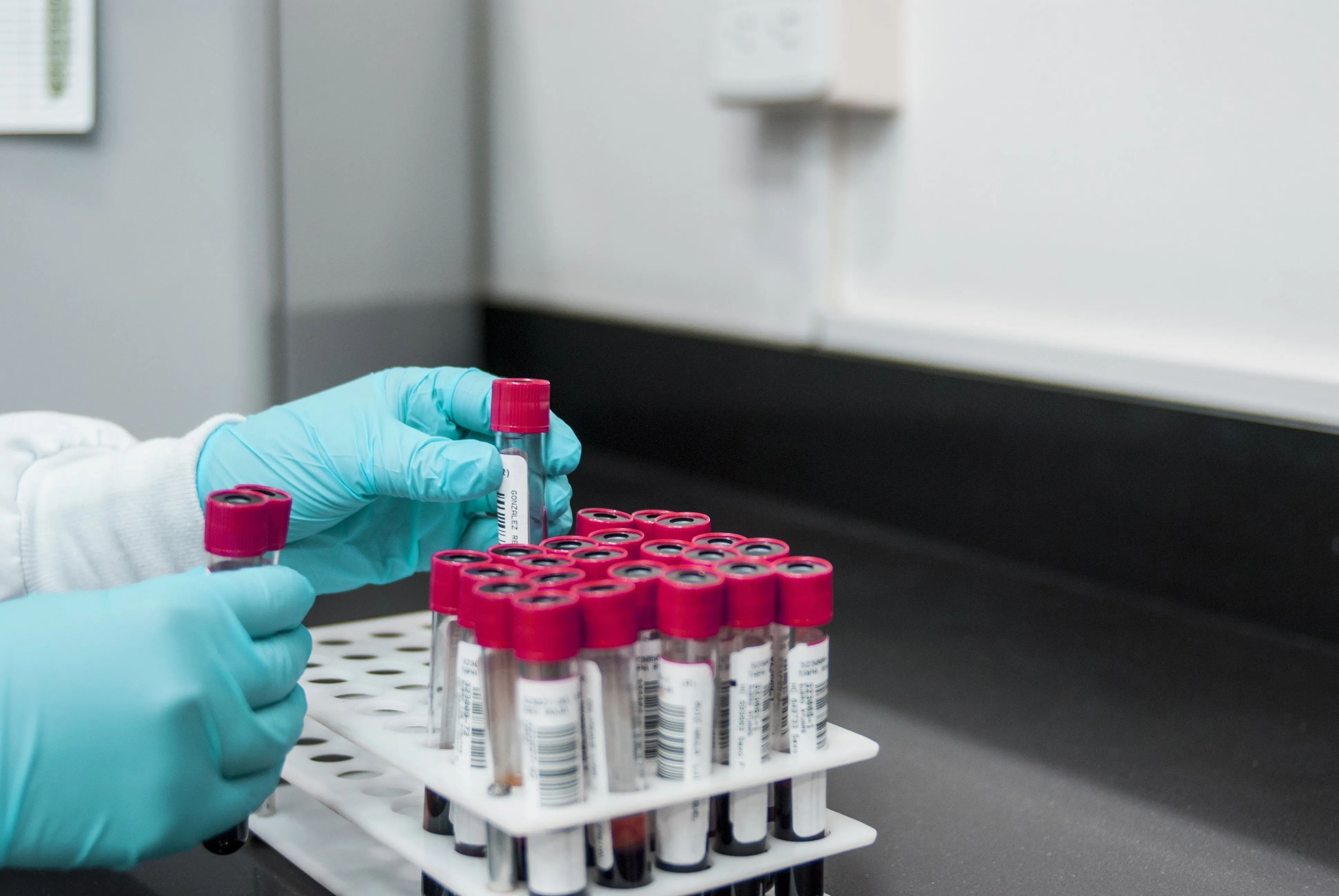What Causes Hashimoto’s Thyroiditis? Key Triggers and Risk Factors
Get Personalized Insights

What Causes Hashimoto’s Thyroiditis? Key Triggers and Risk Factors
Specialised tests identify deficiencies in the body and metabolic disorders associated with the development of Hashimoto’s thyroiditis.
Thyroiditis, or Hashimoto’s disease, is one of the most common autoimmune diseases and significantly affects the quality of life of millions of women worldwide.
Main factors contributing to the onset of Hashimoto’s thyroiditis
The are four main factors that contribute to the onset of Hashimoto's thyroiditis:
- Slow metabolism (due to oxidation and deficiencies in vitamins and other elements)
- Disorder in glucose metabolism
- Lack of vitamin D3 and micronutrients (vitamins, minerals, trace minerals, amino-acids, antioxidants, fatty acids, probiotics)
- Mental stress
These four factors negatively affect the function of thyroid cells. Acting for long periods, they alter the composition and morphology of thyroid cells and deregulate the functioning of the immune system.
Hashimoto’s Thyroiditis & Women
It has been observed that Hashimoto’s thyroiditis mainly affects women. This is due to the particular metabolic profile of women and the multiple hormonal changes that occur throughout their lives: menarche, puberty, ovulation, menstruation, pregnancy, perimenopause, and menopause.
Each hormonal change directly affects the overall metabolic state of the body.
All women experience this, to a lesser or greater extent, a few days before their period, during pregnancy, or during menopause, when appetite, energy levels, mood, weight, and fluid retention change markedly.
Changes and disturbances in metabolism are directly linked to the development of autoimmune disease. Hashimoto’s is a disease with a significant metabolic background. There are four main risk factors that lead to the appearance of this specific disease:
Slow metabolism
Vitamin and micronutrient deficiencies, as well as increased oxidation, block metabolic processes related to the body’s energy production.
Dysfunction in glucose metabolism
Increased consumption of highly processed foods and sugar forces the body to secrete increasingly large amounts of insulin to maintain blood sugar levels within normal limits. Elevated insulin levels disrupt immune system function, worsen autoimmunity, and accelerate gland destruction
Lack of vitamin D3 and micronutrients
Vitamins and nutrients such as vitamin D, omega-3 fatty acids, magnesium, selenium, probiotics, etc. are essential for the smooth functioning of the thyroid and the production of thyroid hormones. Deficiencies in these elements are associated with an increased likelihood of developing Hashimoto’s thyroiditis.
Mental stress
Mental stress causes hormonal and metabolic disturbances that significantly increase the likelihood of developing autoimmunity. Although stress is not sufficient on its own to lead to autoimmunity, in the presence of significant metabolic disorders it can trigger the onset of Hashimoto’s disease.
The above four factors negatively affect the function of thyroid cells. Acting for long periods, they alter the composition and morphology of thyroid cells and deregulate the functioning of the immune system.
These changes in thyroid cell structure cause the immune system to perceive them as foreign. As a result, the immune system attacks these cells and produces antibodies against them.
Notably, hypothyroidism worsens these factors by further slowing metabolism, increasing vitamin D resistance, and impairing mood and cognitive function.
Hashimoto’s thyroiditis is a disease that results from the combination of genetic and epigenetic factors related to lifestyle and environment.
Advanced Lab Tests That Redefine Care for Hashimoto’s
Advanced lab tests that measure nutrient deficiencies, inflammation levels, and metabolic and thyroid health identify the precise clinical interventions needed in lifestyle and nutrition—bringing long-term and significant improvement in the majority of cases.
Kyma’s comprehensive lab panel detects indicators that identify:
- Deficiencies in vitamins, minerals, amino acids, and omega-3 fatty acids
- Metabolic disorders such as insulin resistance
- Inflammation levels
- The presence of disorders in the metabolism of proteins, carbohydrates, and lipids
- The state of the gut microbiome
- Hormonal disorders and thyroid antibodies
Through our clinical experience, we have found that correcting the body’s deficiencies in vitamins and other elements, restoring metabolism, and regulating weight to normal levels can radically change the course of Hashimoto’s disease for the better and improve patients’ quality of life, shifting from steady worsening to steady improvement.
95.7% of our members report a significant improvement in their quality of life. The most common clinical benefits include weight loss and reduced fluid retention, increased energy levels, improved mood, and relief from other symptoms associated with Hashimoto’s disease.
Promptly addressing these factors is critical to halting the progression of the disease.
Bibliographic references
- Metabolic syndrome is associated with an increased incidence of subclinical hypothyroidism – A Cohort Study. Chia-Hsuin Chang et al. Nature > Scientific Reports. July 2017
- Thyroid disease and the metabolic syndrome Mehran et al. Current Opinion in Endocrinology & Diabetes and Obesity: October 2019
- Introducing the thyroid gland as another victim of the insulin resistance syndrome. Jorge Rezzonico et al. Thyroid 2008.
- Gut microbiome and its role in obesity and insulin resistance. Clare J Lee et al. Ann N Y Acad Sci . 2020 Feb. https://pubmed.ncbi.nlm.nih.gov/31087391/
- Metabolic pressure and the breach of immunological self-tolerance Veronica De Rosa, Antonio La Cava & Giuseppe Matarese.18 October 2017. Nature Immunology.
- Non-communicable Diseases in the Era of Precision Medicine: An Overview of the Causing Factors and Prospects. Dimitris Tsoukalas et al. Bio#Futures. Springer, Cham. May 2021.
- Immunomodulatory Function of Vitamin D and Its Role in Autoimmune Thyroid Disease. Rui Zhao et al. Front. Immunol., 19 February 2021.
- Chronic Inflammation in the Context of Everyday Life: Dietary Changes as Mitigating Factors. Margină, D.; Ungurianu, A.; Purdel, C.; Tsoukalas, D. et al Int. J. Environ. Res. Public Health, MDPI (2020). Int. J. Environ. Res. Public Health 2020, 17, 4135.
- Correlation Between Hashimoto's Thyroiditis-Related Thyroid Hormone Levels and 25-Hydroxyvitamin D Guanqun Chao, Yue Zhu, Lizheng Fang. Front Endocrinol (Lausanne). 2020 Feb. https://pubmed.ncbi.nlm.nih.gov/32117049/
- Multiple Nutritional Factors and the Risk of Hashimoto's Thyroiditis Shiqian Hu, Margaret P Rayman. Thyroid . 2017 May. https://pubmed.ncbi.nlm.nih.gov/28290237/
- Improving the Vitamin D Status of Vitamin D Deficient Adults Is Associated With Improved Mitochondrial Oxidative Function in Skeletal Muscle Akash Sinha et. al. J Clin Endocrinol Metab . 2013. https://pubmed.ncbi.nlm.nih.gov/23393184/
- Enhanced oxidative stress in Hashimoto's thyroiditis: inter-relationships to biomarkers of thyroid function.Rostami R1, Aghasi MR, Mohammadi A, Nourooz-Zadeh J. Clin Biochem. 2013 Mar
- Thyroid Hormone Effects on Mitochondrial Energetics Mary-Ellen Harper 1, Erin L Seifert. https://pubmed.ncbi.nlm.nih.gov/18279015/
- Changes in Glucose-Lipid Metabolism, Insulin Resistance, and Inflammatory Factors in Patients With Autoimmune Thyroid Disease Yi Lei et. al. J Clin Lab Anal . 2019https://pubmed.ncbi.nlm.nih.gov/31350776/
- Introducing the thyroid gland as another victim of the insulin resistance syndrome. Jorge Rezzonico et al. Thyroid 2008. https://pubmed.ncbi.nlm.nih.gov/18346005/
- Metabolic profiling of organic and fatty acids in chronic and autoimmune diseases. Evangelia Sarandi, Dimitris Tsoukalas et al. Advances in Clinical Chemistry. July 15, 2020. Elsevier Inc.
- Targeted Metabolomic Analysis of Serum Fatty Acids for the Prediction of Autoimmune Diseases. Dimitris Tsoukalas, Vassileios Fragoulakis, Evangelia Sarandi et. al. Frontiers in Molecular Biosciences, Metabolomics (6), 2019, Published 1 November 2019. https://www.frontiersin.org/articles/10.3389/fmolb.2019.00120/full
- Prediction of Autoimmune Diseases by Targeted Metabolomic Assay of Urinary Organic Acids. Dimitris Tsoukalas et. al. Metabolites. 2020 Dec 8.
- Environmental Exposures and Autoimmune Diseases: Contribution of Gut Microbiome M. Firoze Khan and Hui Wang. Front. Immunol., 10 January 2020
- Non-communicable Diseases in the Era of Precision Medicine: An Overview of the Causing Factors and Prospects. Dimitris Tsoukalas et al. Bio#Futures. Springer, Cham. May 2021.
- Metabolic pressure and the breach of immunological self-tolerance Veronica De Rosa, Antonio La Cava & Giuseppe Matarese.18 October 2017.
- Nature Immunology.Circulating metabolites in progression to islet autoimmunity and type 1 diabetes. Springer Link. Diabetologia, 2019 Dec.





